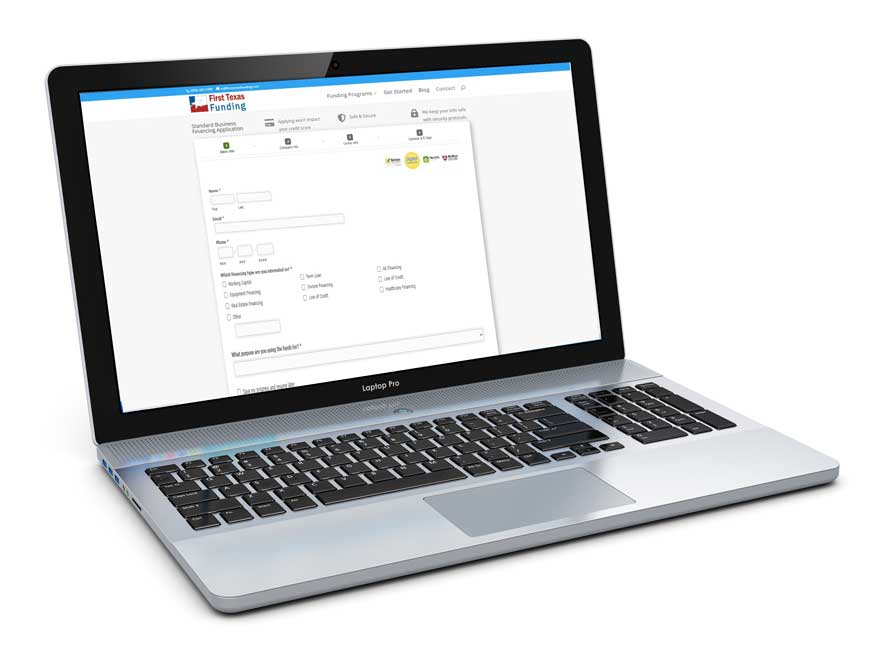Business SBA Loans
Funding Advantages
- Lower interest rates
- Great for newer businesses with $100k+ in revenue
- Some programs allow you to use funds at your discretion

“SBA loans can give much needed funding to undercapitalized businesses.”
What types of Loans does the SBA back?
There are a variety of loans available through the Small Business Administration which can help to fund and grow a business. The three primary types of SBA loans include 7(a) loans, CDC/504 loans, and microloans. Each of these loans is designed to meet the specific needs of different types and sizes of businesses. For instance, 7(a) loans can be used for a variety of purposes such as working capital, equipment purchases, or to refinance debts. CDC/504 loans are specifically for larger, long-term projects such as facility upgrades or expansions. Microloans, on the other hand, are generally smaller and aimed at new or fledgling businesses. When considering which SBA loan is right for your business needs, it is important to take into account factors such as interest rates, repayment terms, and eligibility requirements. Consulting with an SBA-approved lender can help to ensure that you make the best choice for your business’s financial future.
- SBA 7(a) loan, for as high as $5.5 million in cash with terms up to seven years
- CDC/504 loans, which are meant specifically for purchases like real estate and machinery with terms up to 25 years
- SBA microloans for a max of $50,000, which can be repaid for up to six years
Contrary to popular belief, an SBA loan is not a simple bag filled with cash and adorned with a dollar sign to fund your visionary business venture. Unfortunately, it’s not that easy. However, keep in mind that there are three distinctive SBA loan programs, each with unique features, benefits, and requirements.
When selecting from these three loan options, it is important to make a wise decision as each loan serves a distinct purpose, ranging from providing funds for business expenses to financing significant fixed-asset purchases.
The most preferred and versatile type of business loan is the SBA 7(a) loan, commonly known as a traditional term loan.
What are the advantages of an SBA loan?
Low Interest Rates
Securing a small business loan can bring about apprehensions surrounding the overall cost of the loan in the future. Henceforth, the interest rate on that loan becomes a significant area of concern, as low interest rates have a considerable benefit.
SBA loans offer incredibly low interest rates that depend on your creditworthiness and qualifications. However, you can potentially receive a rate as low as 6.75% with an SBA 7(a) loan. Keep in mind that while CDC/504 loans and microloans have slight variations, they are just as affordable.
The SBA loan offers a significant benefit compared to other term loans: there is no risk of interest rates skyrocketing into the double digits or beyond.
Certainly, there are other loans that come at a higher cost due to various factors. Non-SBA loans can impose greater interest rates for reasons like offering quick money or taking a bigger gamble on individuals with scant or no credit history. However, if you require a long-term loan, there’s no better option than an SBA loan when it comes to low-interest capital.
Money Availability
We understand that obtaining funding for your small business may often seem like a daunting task, and we’re aware that you’re probably already aware of this. (Hello, we’re here to assist you.) Furthermore, following the economic downturn, banks have become increasingly hesitant to provide even minor amounts of money to local companies. Risk is the least favored term of a bank.
Small business owners are faced with a difficult situation. However, there are numerous options available for business financing, thanks to the rise of alternative lenders. These lenders offer non-bank business loans that are simpler to qualify for. Nonetheless, for those business owners who require a massive sum of money and cannot obtain it through a conventional financial organization, what course of action should they take?
SBA loans offer an irresistible benefit of procuring capital. The 7(a) loan program permits borrowing as much as $5.5 million, thus enabling one to obtain a substantial amount of capital.
Banks are more inclined to grant multimillion-dollar loans if the Small Business Administration collaborates with them to guarantee up to 85% of such loans in the event of a borrower default. This collaboration enhances the banks’ comfort levels in extending loans, and they don’t perceive risk as a negative attribute when it comes to these loans. Consequently, the availability of more capital is increased for borrowers seeking financing with the SBA participation.
Repayment Terms
Ensuring your small business loan doesn’t cause additional stress is crucial to the loan’s supposed helpfulness. It’s imperative to locate the appropriate product for your financial needs while being confident that the repayment schedule aligns with your business’s cash flow.
SBA loans offer a significant benefit in terms of their repayment and payment schedule, which do not pose any financial burden on your business, on top of having the longest repayment terms available.
Small business loans usually entail payment terms that are significantly shorter. This means that short-term loans necessitate a reimbursement period of a maximum of three months, with payments either daily or weekly. Non-bank term loans, though they may seem more forgiving, merely allow you a maximum of five years to repay the principal amount.
SBA loans offer a significant advantage, giving you more leeway. For real estate purchases, you can make monthly payments for 25 years, for equipment it’s 10 years, and working capital is usually up to seven years. This flexibility helps you adapt your loan payments to your business plan as you develop.
Down Payments
Your lender might request a down payment when seeking financing, depending on the type of loan you seek. The size of the deposit for small business loans is determined by several factors such as the loan amount, purpose, type and your financial history, with poor credit typically leading to higher down payment requirements.
SBA loans stand out as one of the types of business loans that usually necessitate a down payment, yet the required amount is notably less compared to many other loan types. This is a significant advantage of SBA loans since only 10%-20% down payment is enough for an SBA 7(a) loan or a CDC/504 loan. Moreover, an SBA microloan doesn’t call for any down payment at all.
If you happen to come across loans that demand up to 30% down payment, there are others that don’t. Should you get the chance to acquire an option that necessitates a lower down payment, do not hesitate to explore it.
Flexibility to use funds
Certain types of business loans may come with stipulations regarding how funds are utilized, but this is not necessarily a negative aspect. For instance, if you are seeking equipment financing or invoice financing, it is clear that you require funding for a particular purpose.
Occasionally, entrepreneurs simply require capital. While it is crucial to have a well-thought-out strategy for utilizing your small enterprise financing, especially for an SBA loan since a comprehensive plan is a prerequisite for approval, unforeseen circumstances arise or plans may fail. In such situations, it is beneficial to have the flexibility to adapt.
Having access to SBA 7(a) loans means the possibilities for expenditure are extensive. These funds have incredibly flexible conditions, permitting a wide array of options such as debt refinancing, buying land, restocking inventory and financing upgrades. In other words, the investment opportunities are vast.
The loans provided by the CDC/504 are not very adaptable since they are exclusively intended for fixed assets such as real estate and equipment. These loans cannot be used as working capital. Similarly, there are specific guidelines for the utilization of SBA microloans as well.
SBA loans hold an edge in spite of everything.


